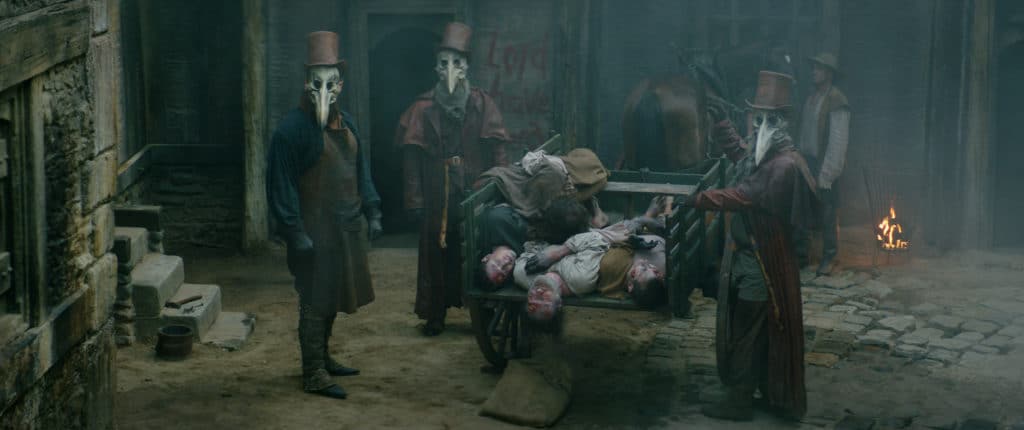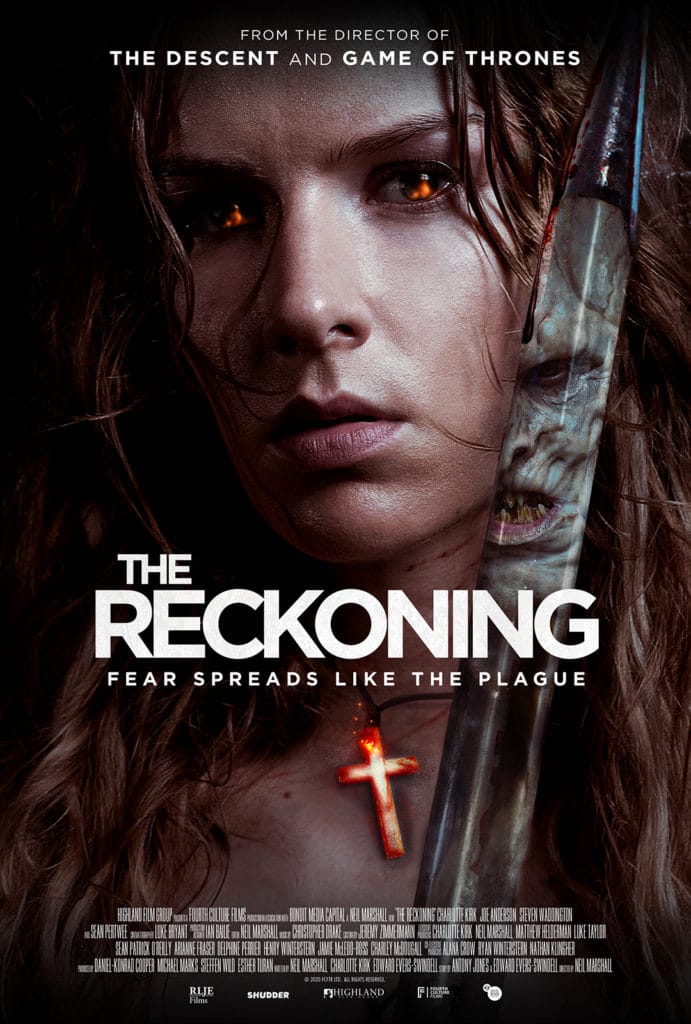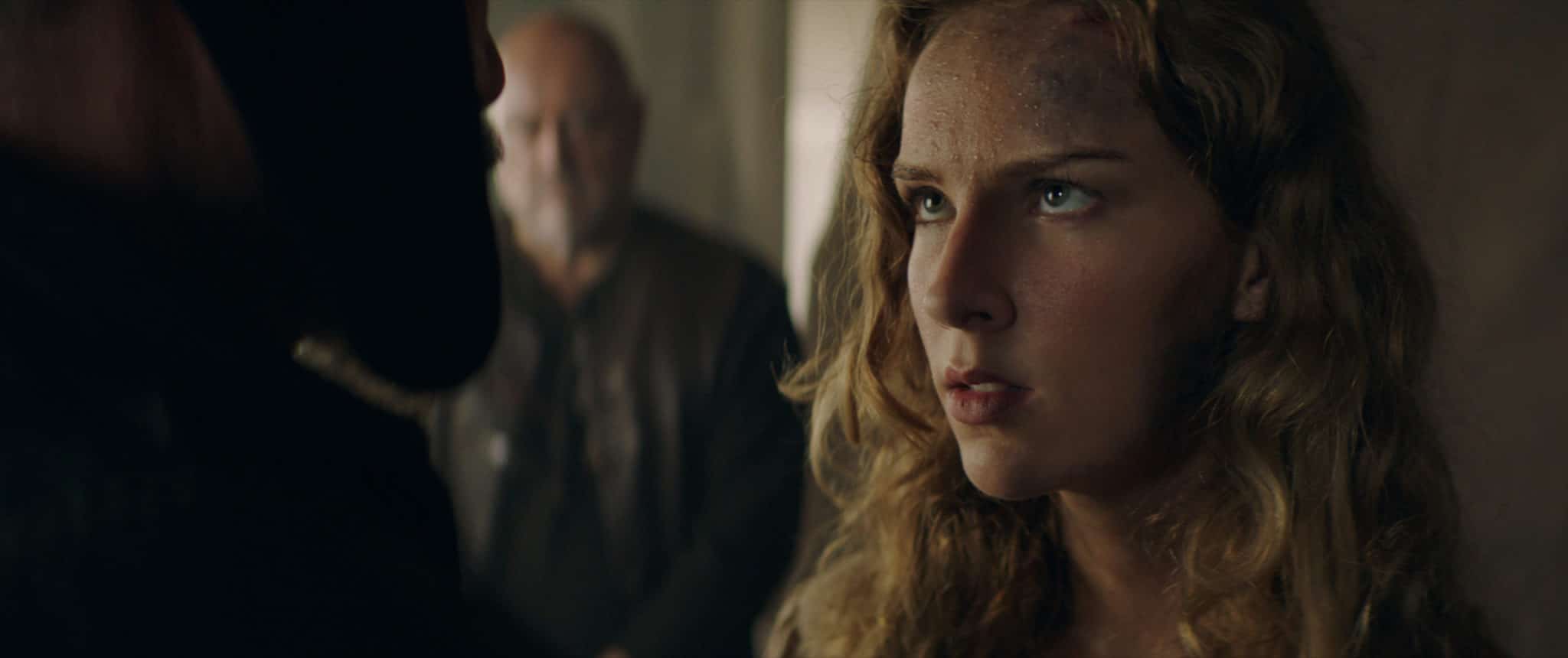
It’s not something I’d normally do but, prior to writing up my own review of the new Neil Marshall film The Reckoning, I took a peek at a few other reviews of the film. Almost without exception, other critics prefaced their review by mentioning how much they loved his work, how The Descent (2005) and Centurion (2010) were amongst their favourite films, and so on and so forth. Well, having seen The Reckoning, I’ve decided against that approach. I’ll say only this: how can a director go from the sublime to the ridiculous to this extreme? ‘Studio interference’ was mooted as the reason that Hellboy (2019) bombed so badly; given that this newer film presumably had none of that, we can only wonder what has happened here. I really wanted to like The Reckoning. A historical horror set during the 17th Century witch trials? Sign me up. Sadly, the end result is an appalling, unworthy mess.
The film starts, as we’re told with some on-screen text, in the year 1665: the plague is running rampant in England, and in their terror the people have become prone to blaming the Devil. By the 1660s witch trials were dwindling in Europe but quite honestly, given the thundering anachronisms which follow, this is more than acceptable artistic licence. So in the film, people’s fears have given rise to the opportunism of witchfinders, who enjoy power and influence as they move throughout England, summarily trying and punishing suspected witches.
Grace (Charlotte Kirk) is a happily-married young woman whose husband leaves her unprotected when, finding himself displaying symptoms of ‘the sickness’, decides to take his own life. Early scenes – where Grace has to cut down and bury her afflicted husband – provide brief hope that this perhaps isn’t going to be half bad. The landscapes and the cottage look appealing; the score, by Christopher Drake, is very good too. Still, bucolic England or not, life for a lone female is tough in the 17th Century and Grace struggles to raise money to pay rent on the farm. This is apparently all part of the plan by dastardly squire Pendleton (Steven Waddington) who wants his wicked way with her. When she refuses his advances…hang on, why does he accept her refusing anything, when he has all the physical clout and, as the script clumsily informs us more than once, a higher social position? No matter. On with the plot. When she refuses his advances and, erm, kicks his ass, he starts rumours in town that she’s a witch, so that she can be arrested and tried.

This means that she must then reside in the local dungeon, where she has the odd inscrutable sexy hallucination, until such time as witchfinder Moorcroft (Sean Pertwee) can get to her. When he does, almost two hours of boring, boring tortures ensue – tortures which we are meant to read as incredibly severe, except Grace emerges from each bout looking no worse for wear than if she’d been caught in a light shower of rain. This unbelievability is cemented by the fact that Charlotte Kirk is woefully miscast here in a lead role, or perhaps in any role; she has one, mouth-slightly-agape pout-scowl which she uses for nearly every circumstance, heinous torture or otherwise. The use of on-screen chapters – a current obsession with filmmakers – to tell us helpfully how many days of ‘torture’ have passed only emphasises how long all of this is taking. It doesn’t matter how many times she gets her arse out – this is dull.
There was a point around forty minutes into this film when I began to wonder if I was reading it all wrong. Was this actually a camp masterpiece, intended as such? I’m yet convinced that this wasn’t the intention. It’s all too pouty, too scowly, too much in earnest. On reflection, as much as this would be a decided move away from Marshall’s past body of work, camp really was the only way to go with The Reckoning – making it more akin to Season of the Witch (2011) rather than aiming for – and missing – Witchfinder General (1968). It would have made the nudity more understandable; it would have disposed with the questions over the Satanic visions which ultimately go nowhere. And, given the juddery, laughable lunacy of the ‘Restoration final girl’ act, much could have been forgiven there, too. The Reckoning’s biggest issue is of its own doing: when you bookend your film with reminders of the real, horrific treatments of women accused of witchcraft, then this invites an eye seeking accuracy, and accuracy there is none. The script has elected not to try and use Early Modern English – fine. But the use of the word ‘okay’, which didn’t appear for around two centuries? The leading lady’s Estuary twang? Plague doctors in top hats (not invented for over another century)? Nuns i.e. illegal dissidents, being used as court officials in Protestant England? Who researched this stuff? Anyone?
The Reckoning is an embarrassing, clumsy film which displays a complete lack of plausibility, plot lulls, plot lurches, dreadful casting (or a misuse of its few good actors) and an array of errors in almost every technical aspect. Neil Marshall no doubt has significant strengths as a director, but this film makes his best work feel very, very far away indeed. By the way, that ain’t how wells work. Avoid, avoid, avoid.
RLJE Films and Shudder will release THE RECKONING in theatres, On Demand and digital on February 5, 2021.
